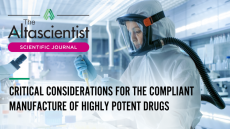Lonza sighs in relief after Alexion buys manufacturing facility
facility in Rhode Island as it gears up for the commercialisation
of its blood disorder drug Soliris, yet the move does not signal
the end of the company's contract manufacturing relationship with
Lonza.
The new facility in Smithfield is expected to begin operations in 2008 so in the mean time Soliris will continue to be made at Lonza's biologics plant in Portsmouth, New Hampshire, with the protein-based drug expected to receive market approval for the US and Europe in 2007. But the Swiss contract manufacturer has said that even after 2008 it will carry on producing Soliris for Alexion at mid-scale capacity. "This is a positive development for us, it confirms Alexion's product is moving along and we will continue to work with them," Lonza spokeswoman Margot Connot told In-PharmaTechnologist.com. "We have dedicated 5,000L bioreactors to manufacture the drug and we are ready should demand from Alexion increase." The biopharmaceutical sector is proving lucrative for manufacturers like Lonza, with approximately one-fourth of new drugs coming on the market being biopharmaceuticals and annual sales projected to surpass $52bn (€41bn) by 2010. However, Soliris treats Paroxysmal Nocturnal Hemoglobinuria, a rare genetic blood disorder which affects only between 8,000 and 10,000 people in the US and Europe. Alexion has not revealed how much revenue it expects from the drug, which is its first product to reach the manufacturing state, neither how much it spent on the Rhode Island site. The Connecticut-based company will be retrofitting the 55,000-square-foot facility to include two 10,000L bioreactors and their associated purification suites along with a pilot plant. After the site is inspected by the US Food and Drug Administration (FDA) and the European Medicines Agency (EMEA) and is cleared for production, it is expected to initially employ 80 people. "For the past ten years, Rhode Island has built an expertise in biopharmaceutical manufacturing, which is one of the reasons this site was particularly appealing to us," said Alexion's president David Keiser. "The facility is highly suitable to our needs and the Rhode Island Economic Development Corporation has worked closely with us." Indeed, Alexion's site selection brings some heartening news for Rhode Island's biotechnology sector which last month was snubbed by Bristol-Myers Squibb when it chose Massachusetts as the location for its new $660m biologics manufacturing facility. Trained labour, accessibility to the site and low operational costs were all factored in to Alexion's decision. According to a local newspaper report, the state may offer worker training grants to the company, which is also discussing a property-tax break with Smithfield. Alexion is the fourth company to occupy the Smithfield plant; the facility was built by Alpha Beta Technologies in 1993 but sold to Collaborative Corporation in 1999 when Alpha's main drug failed, it was then passed on to Dow in 2000 which decided to sell it in 2004 because its contract biomanufacturing ambitions fell through.













